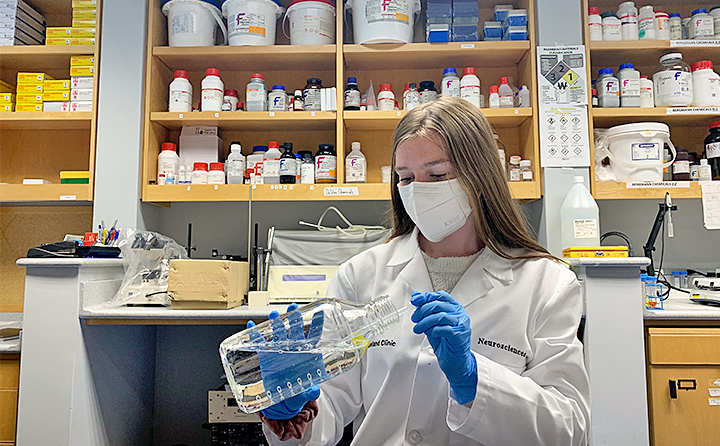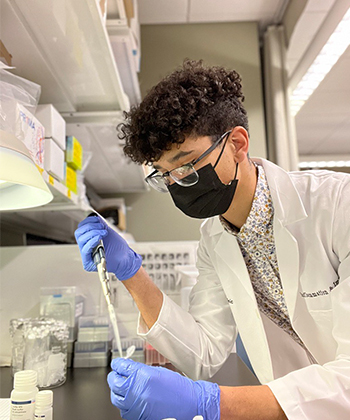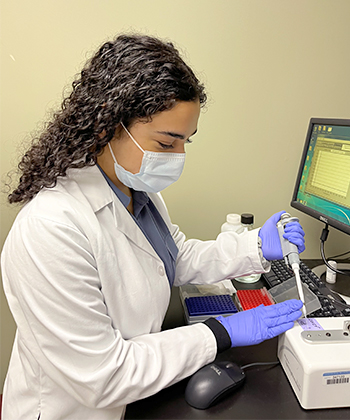When it comes to applying to the best medical schools and graduate programs, Baldwin Wallace students have a leading edge that comes from hands-on research with professors and top research centers.

Over the past several years, BW students have gained valuable experience at internationally recognized, multi-million-dollar grant-funded labs at the Cleveland Clinic Lerner Research Institute, where they can experience innovative research methods, make valuable networking contacts, and build a stellar resume and vita.
The calling card that puts BW students alongside renowned scientists is a proven track record of diligence, professionalism, and the technical and critical thinking skills that make BW undergraduate students important contributors to the lab.
Recently, the Cleveland Clinic Lerner Research Institute formally committed to placing BW Choose Ohio First STEM Scholars and other BW STEM students in its labs.
Among them are STEM Scholars and public health majors Madina Mahmoud '23 and Donavan O'Brien '23, who are currently working in labs at the Lerner Institute. Neuroscience-biology major McKenzie Chappell '22 is also working in a lab before beginning her medical school studies at Case Western Reserve University (CWRU) for pediatric neurology.
Thirty-two miles marks the distance from Chappell's hometown of Painesville, Ohio, to CWRU's medical school. Bridging that pathway was Baldwin Wallace University, where Chappell benefited from the university's strong academics and faculty-alumni connections that led her to the neuroscience lab of Dr. Tara DeSilva in the summer after her first year.
"The primary focuses of our lab are demyelinating diseases, such as multiple sclerosis, and how these pathologies can be better understood by studying neurodevelopment," explained Chappell. "I am currently lead author on a project studying how the cells that make myelin develop and how these mechanisms can serve as potential treatment options for multiple sclerosis.
"This particular area of research is incredibly interesting. I get to watch my bench work become translated into potential therapies that may one day be used in a clinical setting. Research, particularly research of this caliber, taught me how to think critically and work within a team of researchers to answer questions. I also gained the confidence to be an independent thinker and to trust in the knowledge and skills I have gained," she added.

Picking the university that would offer him the best opportunities to get into medical school was easy for O'Brien. The Toledo, Ohio, native was impressed with BW's Primary Healthcare Advancement Program, which offers a pre-med track for aspiring primary care physicians and early assurance partnerships with Ohio University's Heritage College of Osteopathic Medicine, Lake Erie College of Osteopathic Medicine and Northeast Ohio Medical University.
"I recently received a seat in the early assurance pathway for admission to Northeast Ohio Medical University College of Medicine. One of the topics I was able to talk about on my application was my research with the Cleveland Clinic's Lerner Institute. I believe this amazing experience helped me stand apart from other applicants," he acknowledged.
"I began working at the Cleveland Clinic in January, and I am continuing to work there full time for summer. We focus on genetic research by looking at the developmental pathogenesis of various liver diseases in zebrafish," he noted.
"While researching, I have been able to run several fascinating experiments that have allowed me to gain a significant amount of scientific knowledge, which I plan to incorporate in my career," said O'Brien.

Another aspiring physician, Mahmoud is a student researcher with the Cleveland Clinic's Cole Eye Institute. She has been in the Lerner Institute lab since winter break of her sophomore year.
"We specifically work on understanding the immunoregulatory system of the eye as a way to better understand common diseases that affect the eye," explained Mahmoud. "I've learned so many laboratory techniques and work independently as well as collaboratively with the research team.
"Research has given me the opportunity to learn the intricate biology of our bodies. It has challenged my patience and has made me a more detail-oriented person. It also has allowed me to think critically and creatively," the Westlake, Ohio, resident went on to say.
"I chose my public health major because I am passionate about health equity and understanding the social aspects that play an important role in the well-being of individuals. I think it is just as important for aspiring healthcare professionals to learn about the social aspects of health as it is for them to learn about biological and chemical processes. I believe the path I am pursuing will enable me to become the best physician I can be," she said confidently.
While a formalized Choose Ohio First STEM Scholars program affiliation with the Cleveland Clinic Lerner Research Center is a newer initiative, BW students have been in the labs and clinics of the international hospital system for decades. BW graduates work at the Cleveland Clinic in multiple capacities.
BW biology major Tyler Alban '14 recently completed the Lerner Institute's Molecular Medicine Ph.D. Program and is a postdoctoral researcher working on immunotherapy and single-cell genomics. Another biology major, Marko Mrdjen '19, is a second-year student in the same Ph.D. program.